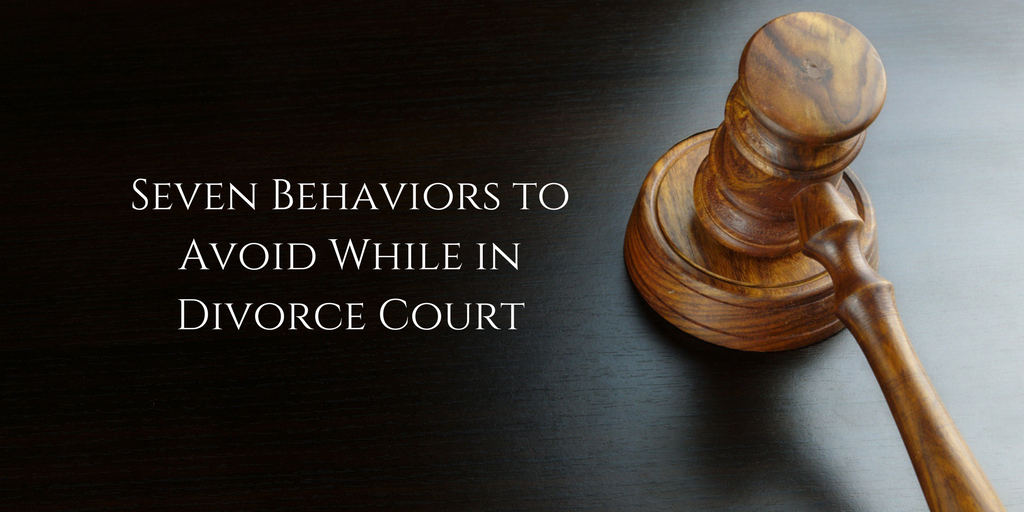As an experienced divorce attorney, I have had the opportunity to appear in court hundreds of times to conduct hundreds of trials for my clients. I have always ensured that they realize that they were going to be appearing in front of only a judge and not a jury. I remind them that the judge has a great deal of discretion in rendering decisions in their case, particularly those involving their children. Although bound by general principles, state statutes and case law, the court has the wide area in which to make decisions regarding all aspects of the children’s life, including timesharing (custody/visitation), support, and other issues concerning your property such as equitable distribution and alimony. Consequently, I always advise my clients regarding the following:
- Dress appropriately. The judge will always take his or her job seriously. They expect, and many demand, that you take seriously your “day in court”. Consequently, dress well. Do not wear shorts, ripped jeans, pants down to your knees, or flip flops. Leave your “Only God Can Judge Me” T‑shirt at home. A trimmed, clean, neat appearance matters a lot to the judge. It shows respect for the court. I usually tell my clients: “Dress as if you were going to an office or attending an important solemn family event such as a funeral.” Men, you do not have to wear a suit and tie (although that would be good to do so). However, a collared shirt goes a long way. Ladies, wear something with sleeves that is not skin tight. The courtroom is not a place for vamping or “striking a pose;”
- All Mobile Phones. Make sure that your telephone does not ring, buzz, chirp, or play the most recent popular song. Some judges are fanatical that all cell phones be turned off. If the proceedings are interrupted by someone’s inopportune buzzing, ringing or singing, the judge may confiscate the cell phone on the spot. At the very least, he will be annoyed and that annoyance may transfer over to your case;
- Less is Best. Do not wear expensive jewelry. It does not serve either side well to wear expensive gaudy jewelry. Remember, try to keep your appearance plain and not be distractive;
- Do not be disrespectful to anyone in a courtroom. At times, you may think that the judge is not watching or does not see what is going on in the courtroom. Believe me, most judges seem to have eyes in the sides and in the backs of their heads. They very much know what is going on in the courtroom. And what they may not see, their bailiffs or their court clerks will be informing them later. If the judge believes that you are being disrespectful to anyone in the courtroom, you may feel the negative impact from that in the decisions he or she makes about your case;
- Above all, do not interrupt the judge when the judge is speaking. Many judges are very frank about a perceived lack of respect towards them. They do not like it. Most judges believe that interrupting them is disrespectful. Consequently, avoid doing so at all costs. The judge will give you the opportunity to address the issues on your side of the case, as well as any allegations or statements made in the testimony of any witnesses or your spouse;
- Do not propose outlandish or unrealistic solutions to the issues in your case. No doubt, most contested divorces involve sensitive issues and can evoke high emotions when children are involved. It may take elevated emotions and overreaction to a much higher level. Whether the issue before the judge is temporary relief or the final decision regarding one of your issues in your divorce case, the judge expects the parties will propose reasonable options. If the judge believes that you are being unreasonable in making your position in front of him or her, it may negatively impact the court’s decision about that issue. If your presiding judge believes you are attempting to be reasonable when your spouse is not, then I believe it will go a long way when the judge decides that issue;
- Do not say something that rubs the judge the wrong way. Judges are human beings. They have their individual foibles and hot buttons. Consequently, you should learn from your attorney what the judge’s “hot buttons” are and avoid them at all costs. If you cannot avoid hitting a judge’s “hot button” issue, then follow the rule above – be reasonable in your expectations (options/issues/solutions).
Judges are human beings just like all of us. And, like all of us, judges form opinions very quickly about the individuals in front of them. I believe that judges do attempt in good faith to remain neutral and appear objective during court proceedings. However, you (as a litigant in front of a judge), can have a big influence on the result of your case and the court’s decision just by how you act and appear in front of the judge. By following the above advice, you can ensure that the judge will be concentrating more on the facts than upon your behaviors in rendering his or her decisions in your case.
Board Certified Marital and Family Law Attorney Charles D. Jamieson understands that divorce is an extremely sensitive and important issue. Thanks to extensive experience and a focus on open communication, Attorney Jamieson adeptly addresses the complex issues surrounding divorce while delivering excellent personal service. If you are 50 years old or older and are involved in or contemplating a divorce, then immediately contact The Law Firm of Charles D. Jamieson, P.A. or call 561-478-0312 to schedule a consultation.



